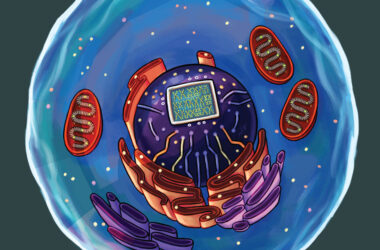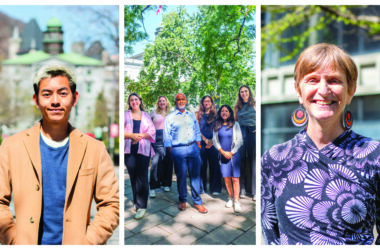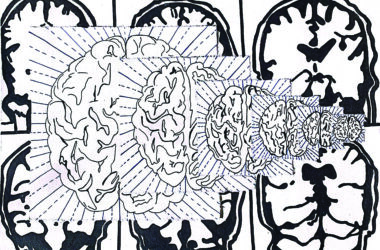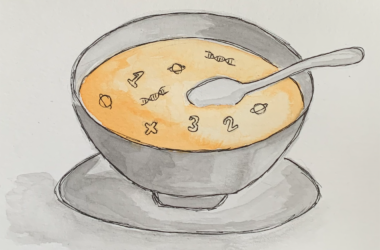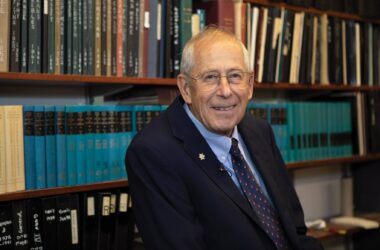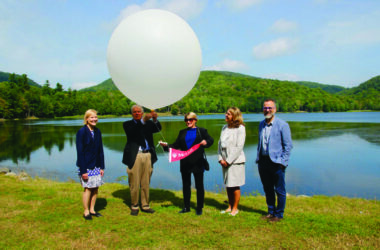Blue-green algae are a common sight at summer swimming holes and lakes. Also known as cyanobacteria, blue-green algae are a class of bacteria capable of using sunlight as an energy source through photosynthesis. Despite being well-known and well-studied, a group of McGill researchers uncovered an unexpected and surprising activity in[Read More…]
Science & Technology
The latest in science and technology.
Artificial cells offer hope for COVID-19 & cancer patients
Sixty-five years and four Nobel Prize nominations after Dr. Thomas Chang invented the first artificial cell in his McGill dorm room, the invention is still improving lives in countless new ways. From blood transfusions to cancer suppression and, most recently, COVID-19 treatments, Chang’s invention continues to push the boundaries of[Read More…]
McGill’s Catalyst Awards celebrate community contributions to sustainability
In September 2022, McGill’s Office of Sustainability granted three Catalyst Awards recognizing students, staff, and projects that have made exceptional strides in pushing sustainability forward at McGill. “Since its first edition in 2011, the purpose of the awards has always been to acknowledge and celebrate those who led the way[Read More…]
Honey, I shrunk the brains!
Aging is one of the few truly universal experiences, yet it is one of those things that no one really looks forward to. Along with visible signs like wrinkles and grey hair, however, comes a more insidious and harder-to-combat symptom: The decline of brain function. But according to a new[Read More…]
Mapping behaviour using genetic biomarkers
What if you could visibly lay out your entire genome sequence in front of you and see almost everything that explains who you are, from your eye colour to whether you’re an introvert or an extrovert? If this were true, we look at someone’s genes and calculate whether they will[Read More…]
Predicting and preventing stroke with Sonoplaque
In 2012, Karina Gasbarrino‘s grandfather passed away from an ischemic stroke. Since then, Gasbarrino, a graduate of McGill’s PhD program in experimental medicine, has dedicated her career to understanding and developing early stroke prevention methods. In 2019, she succeeded, launching the digital health startup PLAKK, a cutting-edge tool that helps[Read More…]
As ice sheets melt, will Greenland mine?
While many are worried about large swaths of land disappearing under water as global sea levels rise due to melting ice sheets in the Arctic, Greenland finds itself with a different problem: Its coastline is growing. Scientists have observed that when Greenland’s ice melts, it runs down to the ocean,[Read More…]
34th edition of Soup and Science delivers lots of science, but no soup
The 34th edition of Soup and Science, an event for prospective undergraduate researchers and curious students organized by McGill’s Faculty of Science, made such a comeback that the in-person registration was full. During the week of Sept. 19, The McGill Tribune attended two fascinating talks about the medical uses of[Read More…]
From humans on Mars to the expanding universe
Staring at an image of the Milky Way, James Peebles, the 2019 Nobel Prize winner in Physics, verbalized what his audience was thinking: “Isn’t that beautiful?”Just about everyone can agree that our galaxy is a remarkable sight. It was Sept. 16 and Peebles was visiting McGill to deliver the annual[Read More…]
Developing a multi-dimensional picture of the Saint-Lawrence River Valley
A few days before former McGill Principal and Vice-Chancellor Suzanne Fortier stepped down, she attended the inauguration of the Adaptable Earth Observation System (AEOS) facility at McGill’s Gault Nature Reserve. The new building, buried between the modest peaks of Mont-St-Hilaire, serves as a home to a biology lab and an[Read More…]

